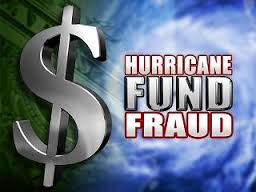Beware Disaster Scams in the Wake of Hurricane Harvey

Identity thieves prey on those who are most vulnerable. You may be in the process of cleaning up your lives, but predators running disaster scams may want to clean up on you by stealing your valuable private information.
As we learned from Hurricane Katrina and Superstorm Sandy, one of the most despicable side effects of a natural disaster is the massive increase in reported cases of identity theft in the affected areas. Thieves take advantage of those who are vulnerable, and those who have suffered flooding, wind damage and the effects of the storm are more vulnerable than ever. Imagine how devastating it would it be to apply for a line of credit to help your family recover from the storm only to find out that your entire net worth now belongs to a thief.
Here are some of the highest priority actions for victims of Hurricane Harvey to take once they have taken care of their immediate safety needs.
Secure your personal information immediately. Clean-up crews will be heading to the area. MOST are good-hearted volunteers, but some are coming with the intent of looking for physical clues to help them steal identities. In your distress, you may not even know what to think of. Be sure you’ve accounted for:
- Social Security cards, statements or related documents
- Birth certificates, passports and drivers licenses
- Wallets, purses, checkbooks and boxes of extra checks
- All financial records, including bank, brokerage, mortgage, credit card, and insurance
- All digital devices containing sensitive information, including laptops, computers, smartphones, iPads, etc.

Beware of people offering “help” falsely using recognized names like FEMA or Red Cross. Organizations like this will never contact you; the only time they ask for money or any personal information is after you have contacted them. The key here is to be skeptical if anyone is asking for your personal information, even as part of emergency relief. Ask enough questions that you can verify who they are, their intentions and their credibility. Do not just give away information in exchange for a promise (e.g., “This is how you will get a reimbursement from the government”). Make sure they are who they say they are.
As a side note, for those of you who are not disaster victims but want to help, the same rule applies: you should contact the agencies. Don’t fall for phone solicitations or pleas via email that may lead you to fraudulent websites. One key to look for is “.org” that most non-profits use rather than “.com” in the address.
Beware of fly-by-night contractors offering cheap or quick repairs. To protect yourself, check on the business. Make sure they have a permanent business address, carry insurance, and have been in operation for more than a year. Very importantly, get a written contract before you give out any money!
Place a Fraud Alert on Your Credit File. Immediately place a Fraud Alert with all three credit-reporting bureaus (listed below). This is only a temporary solution, but a necessary step. Once the water has receded, consider freezing your credit.
- Equifax: 1-800-525-6285 or Equifax.com.
- Experian: 1-888-397-3742 or Experian.com.
- TransUnion:1-800-680-7289 or TransUnion.com.
Order & Monitor Your Credit History. By law, you are entitled to one free report from each agency once a year. The easiest way to get a report is to visit AnnualCreditReport.com or call 1-877-322-8228. You can also request your first report when you are placing a Fraud Alert on your account in Step 1, above. Review your credit report for signs of theft or fraud. If you discover irregularities (accounts you never opened, loans that aren’t yours, credit cards you don’t recognize), contact the credit bureau immediately to report fraud, as well as the company listed in the credit report.
Monitor Your Statements Online. Half of the battle in minimizing identity theft is catching it quickly after it happens. Online bank, credit card and brokerage statements will allow those with Internet access to monitor and detect suspicious transactions on a daily basis. If you have access to the Internet, check your bank, credit card and investment statements to make sure that you recognize every transaction.
Resist the temptation to click on photos from questionable sites. We are a society that thrives on sensationalized images. However, some of those dramatic photos we want to know more about are infected with malware. Stick to legitimate news sites and be especially wary of links on social media sites.
Remember to make safety a priority in every area of your life as you work your way through this trying time. Our hearts are with you.
John Sileo is an an award-winning author and keynote speaker on identity theft, internet privacy, fraud training & technology defense. John specializes in making security entertaining, so that it works. John is CEO of The Sileo Group, whose clients include the Pentagon, Visa, Homeland Security & Pfizer. John’s body of work includes appearances on 60 Minutes, Rachael Ray, Anderson Cooper & Fox Business. Contact him directly on 800.258.8076.
Sorry, comments for this entry are closed at this time.









1 Trackbacks/Pingbacks